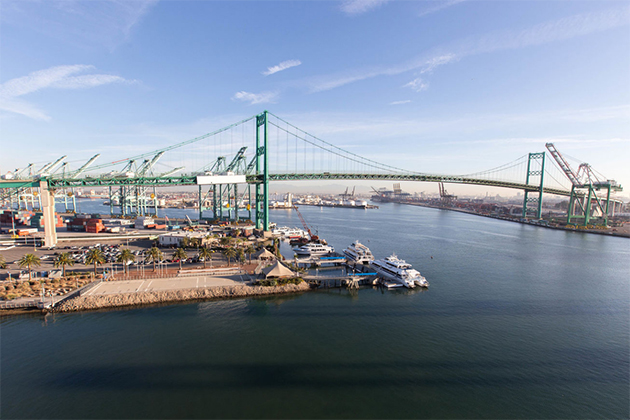A Mercator study commissioned by the Pacific Maritime Association (PMA) warns that high U.S. rail costs and other factors could cause U.S. West Coast (USWC) ports to lose between 15% to 45% of intermodal import business to British Columbia (BC) ports by 2030.
The report says 15% of “Intact Intermodal import volumes” could be lost by 2022 and over “45% of the USWC’s current intact intermodal import traffic is at risk of diversion to BC ports over the balance of this decade.”

So, Ports of Los Angeles and Long Beach intermodal container rail shipments are higher than from Ports of Prince Rupert and Vancouver rail shipments to the following destinations:
- $640 higher to Chicago
- $625 higher to Detroit
- $325 higher to Memphis
The report cites the Canadian investment in port and rail-handling infrastructure at the two Canadian ports and warns: “Even without the development of Port Metro Vancouver’s Roberts Bank Terminal 2 later this decade, capacity expansion projects already underway in container terminals in Prince Rupert and Vancouver could provide those two ports with the physical ability by 2022 to divert approximately 15% of the Intact Intermodal import volumes now moving through San Pedro Bay and the Puget Sound.”
The Mercator report notes that investments in Vancouver and Prince Rupert terminals can spell loss of markets for US West Coast ports: “Of the roughly 1.2 million TEUs/year of new capacity being added to these two terminals by or before 2023, at least 630,000 TEUs should be available for import flows.”
This means: “Taking into account the capacity required to support organic growth of Canadian imports from Asia, Mercator estimates that at least 400,000 TEUs of the new capacity should be available to handle diverted Intact Intermodal import flows from USWC ports.”
At the same time, “the San Pedro Bay gateway does not compete with the two BC ports for imports into Texas, as well as for imports to several secondary Midwest markets (Kansas City, St. Louis, Omaha)…”
Terminal costs at U.S. West Coast ports were responsible for $200- $260 of the cost differential in ship to trains charges compared to the British Columbia ports:
Average Ship To Train Charges By Region Per FEU
| Ship-Train Handling | Surcharges | Total Cost | |
| San Pedro Bay (SPB) | $520 | $140 | $660 |
| Other USWC | $510 | $90 | $600 |
| BC | $400 | $1 | $40 |
| Source: Mercator | |||
The Mercator report found that “cost advantages of Vancouver—and especially Prince Rupert—over SPB and Puget Sound are underpinned’ by the following:
- Lower costs for locomotive fuel, ownership/leasing, and maintenance/repair for CP (Canadian Pacific Railway) and especially CN (Canadian National Railway) trains.
- Lower unit costs for marine terminal labor and lower terminal lease rates.
- Avoidance of payment of the Harbor Maintenance Tax and (for SPB only) of the Alameda Corridor Transportation Authority transit fee.
The report noted high terminal handling costs at U.S. West Coast ports:
“It is evident from this analysis that before surcharges, USWC ports have substantially higher costs for ship-to-train handling. SPB costs are about $120 higher than in BC. Surcharges include the Harbor Maintenance Fee in the US (0.125% of cargo value, which we estimate to be about $90/container) and the Alameda Corridor Fee in San Pedro Bay ($26.33 per TEU, or nearly $50 per container). While all US ports have the same Harbor Maintenance Fee (estimated to be $90/container), BC port users pay only an inconsequentially small infrastructure fee. SPB traffic also pays the Alameda Corridor Fee of nearly $50/container.“

